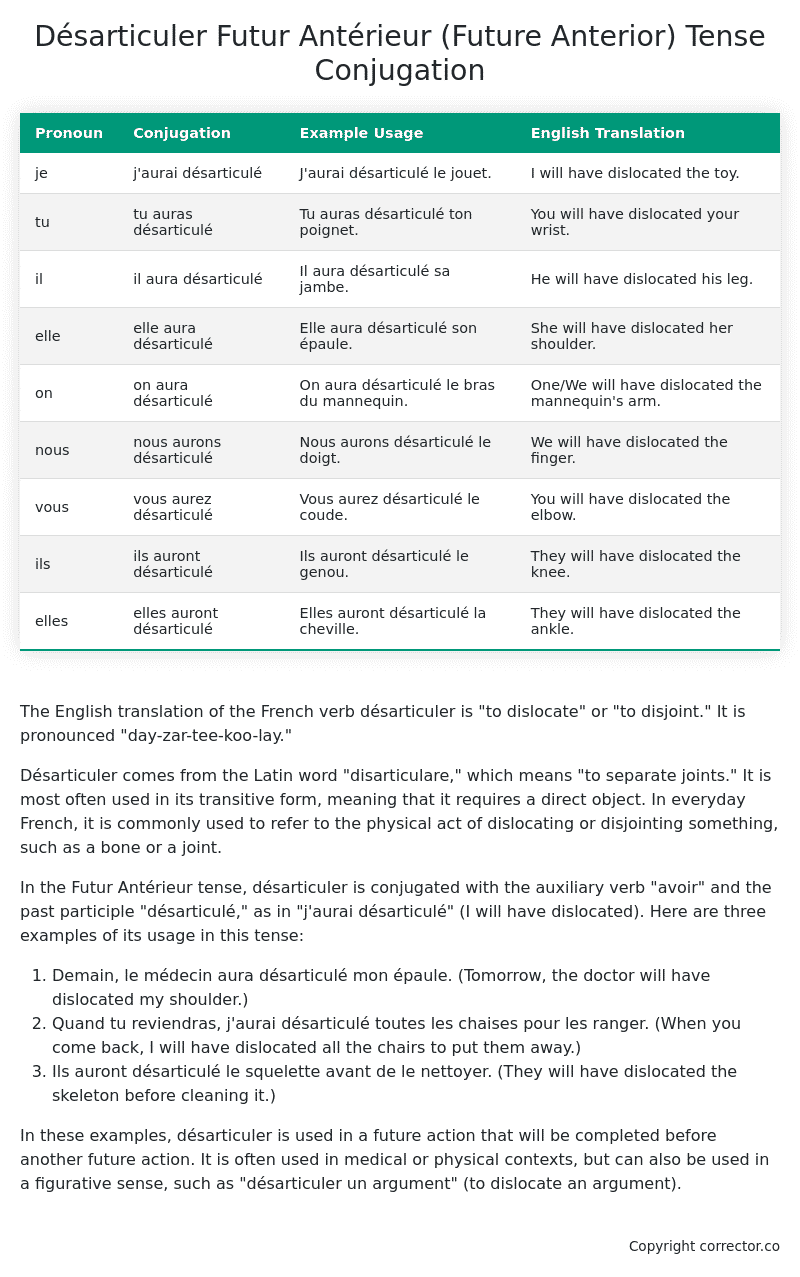Futur Antérieur (Future Anterior) Tense Conjugation of the French Verb désarticuler
Introduction to the verb désarticuler
The English translation of the French verb désarticuler is “to dislocate” or “to disjoint.” It is pronounced “day-zar-tee-koo-lay.”
Désarticuler comes from the Latin word “disarticulare,” which means “to separate joints.” It is most often used in its transitive form, meaning that it requires a direct object. In everyday French, it is commonly used to refer to the physical act of dislocating or disjointing something, such as a bone or a joint.
In the Futur Antérieur tense, désarticuler is conjugated with the auxiliary verb “avoir” and the past participle “désarticulé,” as in “j’aurai désarticulé” (I will have dislocated). Here are three examples of its usage in this tense:
- Demain, le médecin aura désarticulé mon épaule. (Tomorrow, the doctor will have dislocated my shoulder.)
- Quand tu reviendras, j’aurai désarticulé toutes les chaises pour les ranger. (When you come back, I will have dislocated all the chairs to put them away.)
- Ils auront désarticulé le squelette avant de le nettoyer. (They will have dislocated the skeleton before cleaning it.)
In these examples, désarticuler is used in a future action that will be completed before another future action. It is often used in medical or physical contexts, but can also be used in a figurative sense, such as “désarticuler un argument” (to dislocate an argument).
Table of the Futur Antérieur (Future Anterior) Tense Conjugation of désarticuler
| Pronoun | Conjugation | Example Usage | English Translation |
|---|---|---|---|
| je | j’aurai désarticulé | J’aurai désarticulé le jouet. | I will have dislocated the toy. |
| tu | tu auras désarticulé | Tu auras désarticulé ton poignet. | You will have dislocated your wrist. |
| il | il aura désarticulé | Il aura désarticulé sa jambe. | He will have dislocated his leg. |
| elle | elle aura désarticulé | Elle aura désarticulé son épaule. | She will have dislocated her shoulder. |
| on | on aura désarticulé | On aura désarticulé le bras du mannequin. | One/We will have dislocated the mannequin’s arm. |
| nous | nous aurons désarticulé | Nous aurons désarticulé le doigt. | We will have dislocated the finger. |
| vous | vous aurez désarticulé | Vous aurez désarticulé le coude. | You will have dislocated the elbow. |
| ils | ils auront désarticulé | Ils auront désarticulé le genou. | They will have dislocated the knee. |
| elles | elles auront désarticulé | Elles auront désarticulé la cheville. | They will have dislocated the ankle. |
Other Conjugations for Désarticuler.
Le Present (Present Tense) Conjugation of the French Verb désarticuler
Imparfait (Imperfect) Tense Conjugation of the French Verb désarticuler
Passé Simple (Simple Past) Tense Conjugation of the French Verb désarticuler
Passé Composé (Present Perfect) Tense Conjugation of the French Verb désarticuler
Futur Simple (Simple Future) Tense Conjugation of the French Verb désarticuler
Futur Proche (Near Future) Tense Conjugation of the French Verb désarticuler
Plus-que-parfait (Pluperfect) Tense Conjugation of the French Verb désarticuler
Passé Antérieur (Past Anterior) Tense Conjugation of the French Verb désarticuler
Futur Antérieur (Future Anterior) Tense Conjugation of the French Verb désarticuler (this article)
Subjonctif Présent (Subjunctive Present) Tense Conjugation of the French Verb désarticuler
Subjonctif Passé (Subjunctive Past) Tense Conjugation of the French Verb désarticuler
Subjonctif Imparfait (Subjunctive Imperfect) Tense Conjugation of the French Verb désarticuler
Conditionnel Présent (Conditional Present) Tense Conjugation of the French Verb désarticuler
Conditionnel Passé (Conditional Past) Tense Conjugation of the French Verb désarticuler
L’impératif Présent (Imperative Present) Tense Conjugation of the French Verb désarticuler
L’infinitif Présent (Infinitive Present) Tense Conjugation of the French Verb désarticuler
Struggling with French verbs or the language in general? Why not use our free French Grammar Checker – no registration required!
Get a FREE Download Study Sheet of this Conjugation 🔥
Simply right click the image below, click “save image” and get your free reference for the désarticuler Futur Antérieur tense conjugation!

Désarticuler – About the French Futur Antérieur (Future Anterior) Tense
Construction
Common Everyday Usage Patterns
Interactions with Other Tenses
For example
Summary
I hope you enjoyed this article on the verb désarticuler. Still in a learning mood? Check out another TOTALLY random French verb conjugation!


